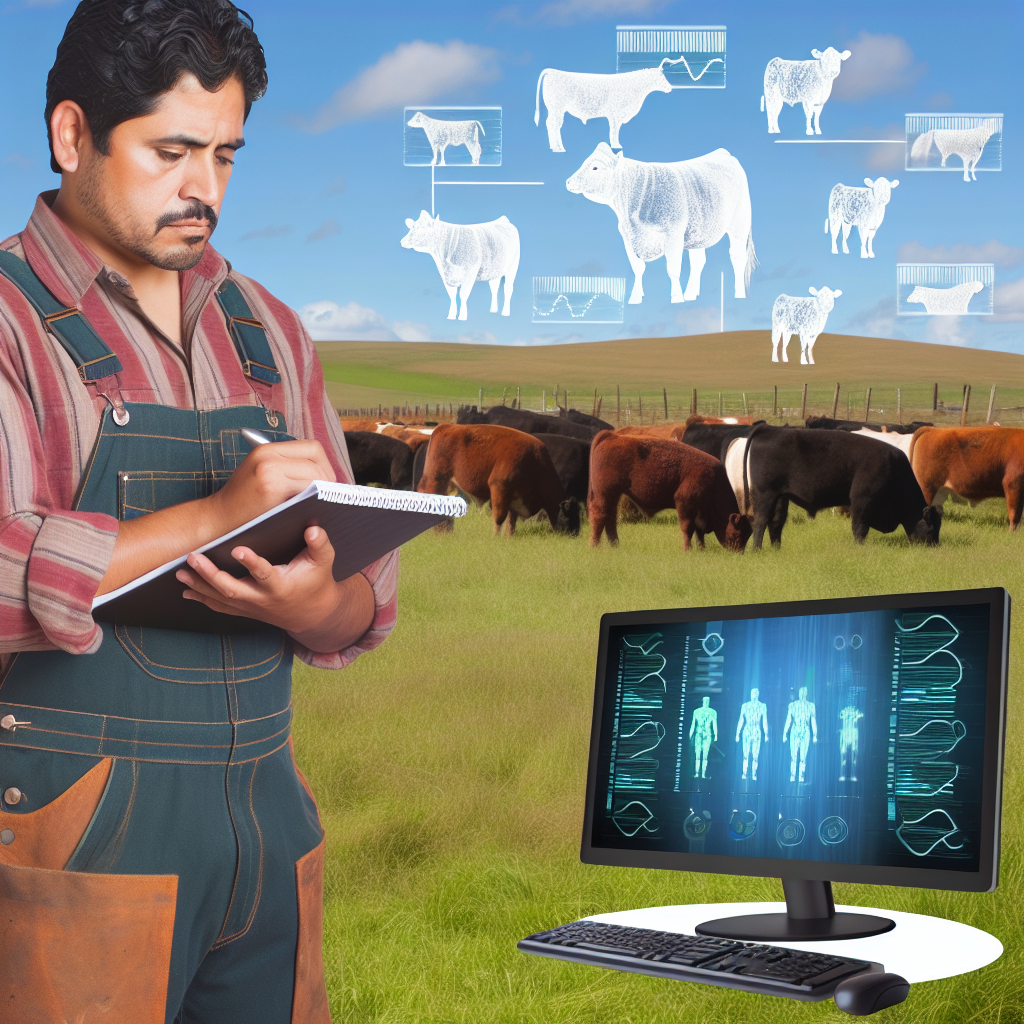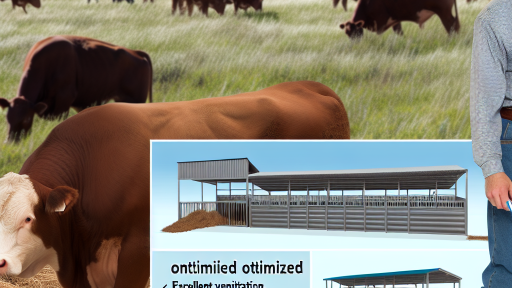Understanding the Basics of Genetics in Livestock
What is Genetics?
Genetics studies heredity and variation in organisms.
It helps us understand how traits are passed down through generations.
Moreover, genetics is crucial for breeding livestock with desirable qualities.
How Genetics Influences Livestock
Genetic makeup dictates the physical traits of livestock.
These traits include size, color, and disease resistance.
Additionally, genetics impacts productivity in farming operations.
Importance of Genetic Diversity
Genetic diversity is vital for a healthy livestock population.
It improves resilience against diseases and environmental changes.
Furthermore, diverse genetics can enhance productivity and profitability.
Key Genetic Concepts
Understanding dominant and recessive traits is essential.
Dominant traits can mask the presence of recessive traits.
Knowledge of genetics also involves understanding genotype vs. phenotype.
Application of Genetics in Breeding
Genetic selection plays a significant role in livestock breeding programs.
Breeders use genetics to enhance traits like growth rate and fertility.
Moreover, genetic testing can identify the best breeding pairings.
Transform Your Agribusiness
Unlock your farm's potential with expert advice tailored to your needs. Get actionable steps that drive real results.
Get StartedUsing Genetic Tools
Several tools aid in genetic management.
- DNA testing provides insight into the genetic makeup of livestock.
- Genomic selection allows for precise breeding decisions.
- Software tools can assist in tracking genetic traits over time.
Future Trends in Livestock Genetics
Emerging technologies are shaping the future of livestock genetics.
CRISPR technology offers precise editing of animal genomes.
Additionally, advancements in data analytics can refine breeding strategies.
Benefits of Genetic Integration in Livestock Management
Improved Health and Resilience
Integrating genetics enhances livestock health and resilience.
By selecting animals with favorable traits, you reduce disease susceptibility.
This practice leads to lower veterinary costs and higher overall productivity.
Moreover, healthier animals contribute to improved farm sustainability.
Increased Productivity
Genetic integration drives greater productivity in livestock operations.
By choosing superior breeding stock, you can achieve higher yields.
This includes improvements in milk production and meat quality.
Consequently, your profit margins can expand significantly.
Adaptation to Environmental Challenges
Genetically integrated livestock better adapt to changing environments.
These animals may demonstrate increased tolerance to heat and cold.
Additionally, they can handle drought conditions more effectively.
This adaptability helps ensure consistent production despite climate variations.
Enhanced Genetic Diversity
Integrating genetics fosters greater genetic diversity within herds.
Diverse genetics mitigate the risks of inbreeding and related issues.
Consequently, this leads to stronger and more robust animal populations.
Fostering diversity can also enhance the overall resilience of your livestock.
Improved Breeding Decisions
Using genetic data empowers more informed breeding decisions.
Producers can identify and select animals based on performance traits.
This data-driven approach minimizes guesswork in breeding programs.
Further, it enhances the efficiency of genetic progress over time.
Showcase Your Farming Business
Publish your professional farming services profile on our blog for a one-time fee of $200 and reach a dedicated audience of farmers and agribusiness owners.
Publish Your ProfileKey Genetic Traits to Consider for Different Livestock Species
Cattle
Cattle breeding focuses on specific genetic traits.
Important traits include growth rate and feed efficiency.
Moreover, breeding for disease resistance enhances herd health.
Milk production traits are also crucial for dairy cattle.
Genetic diversity helps improve overall resilience.
Pigs
Pig farmers should prioritize growth performance traits.
Traits like feed conversion ratio significantly impact profitability.
Carcass quality traits enhance marketability of the meat.
Fertility traits can increase the breeding efficiency of sows.
Additionally, disease resistance reduces veterinary costs.
Sheep
In sheep, wool quality is a key genetic trait to consider.
Therefore, selecting for increased fleece weight is beneficial.
Meat quality traits, such as tenderness, are also important.
Furthermore, reproductive traits can enhance flock productivity.
Disease resistance traits contribute to flock health over time.
Goats
Breeding goats requires attention to milk production traits.
Genetic traits related to adaptability to environment are crucial.
Furthermore, growth rate impacts overall herd viability.
Additionally, disease resistance enhances long-term health.
Litter size traits can improve reproductive efficiency.
Poultry
Poultry genetics focuses on growth rate and feed efficiency.
Egg production traits are vital for layers, improving output.
Meat quality traits benefit broilers, influencing consumer preference.
Health traits are essential for maintaining flock well-being.
Additionally, behavioral traits can enhance management efficiency.
Gain More Insights: Natural Health Management for Beef Cattle
Methods for Assessing Genetic Quality in Your Herd
Understanding Genetic Evaluation
Genetic evaluation is crucial for improving herd quality.
This process involves analyzing an animal’s genetic traits.
Accurate evaluations help producers make informed decisions.
They can select animals that enhance desired traits.
Utilizing Performance Records
Performance records serve as a valuable tool.
By tracking growth rates, producers assess genetic potential.
Additionally, data on reproduction efficiency is critical.
Keep comprehensive records for each animal in your herd.
This data allows for comparisons between generations.
Conducting Genetic Testing
Genetic testing provides in-depth insights into breeding quality.
Various tests reveal traits like disease resistance and growth rates.
DNA tests help identify genetic disorders early.
With this information, you can make strategic breeding decisions.
Implementing Breeding Objectives
Establish clear breeding objectives tailored to your goals.
Showcase Your Farming Business
Publish your professional farming services profile on our blog for a one-time fee of $200 and reach a dedicated audience of farmers and agribusiness owners.
Publish Your ProfileYour objectives should focus on improving specific traits.
Consider factors like growth rates, feed efficiency, and reproduction.
Consistently review and adjust your objectives as needed.
Using Pedigree Analysis
Pedigree analysis helps trace genetic traits in your herd.
This analysis reveals the lineage of each animal.
Examine ancestors to understand inherited traits.
Documenting pedigree information enhances breeding selections.
Engaging in Field Trials
Field trials allow you to observe genetic performance firsthand.
Conduct these trials to test different genetic lines.
Measurements like weight gain and health milestones are valuable.
Such trials provide practical insights into genetic potential.
Consulting Specialists
Consultation with genetic specialists enhances your strategy.
These experts provide guidance based on current research.
They can help with interpreting performance data and tests.
Collaboration with specialists leads to more informed decisions.
Learn More: Seasonal Care Tips for Exotic Animals
Developing a Genetic Improvement Plan for Your Livestock
Understanding Genetic Potential
Genetic potential defines your livestock’s ability to thrive and produce.
First, assess the current performance of your animals.
Next, identify traits that you want to improve.
Focus on productivity, health, and reproductive efficiency.
Animal genetics also varies based on breed and lineage.
Thus, research your livestock’s genetic background thoroughly.
Setting Genetic Goals
Establish clear, measurable goals for your genetic improvements.
Consider both short-term and long-term objectives.
Your goals could include enhanced growth rates or better milk production.
Involve relevant stakeholders in your planning process.
This may include veterinarians, geneticists, and farm managers.
Selecting Breeding Stock
Carefully select breeding stock based on your genetic goals.
Prioritize individuals with desirable traits and proven performance.
Utilize tools such as performance records and genetic evaluations.
Additionally, consider incorporating artificial insemination techniques.
This practice allows for access to superior genetics.
Integrating Technology
Embrace technology to enhance your genetic improvement efforts.
Using genomic testing can provide valuable insights.
Genomic data helps in making informed breeding decisions.
Investing in software for tracking genetics can streamline processes.
Furthermore, consider collaborating with genetic companies for support.
Monitoring Progress
Regularly monitor and evaluate the success of your breeding program.
Collect data on performance metrics that align with your goals.
Adjust your strategies as needed based on this data.
Showcase Your Farming Business
Publish your professional farming services profile on our blog for a one-time fee of $200 and reach a dedicated audience of farmers and agribusiness owners.
Publish Your ProfileEngage your team in discussions about progress and challenges.
Continuous improvement should be the focus of your management plan.
Education and Training
Educate yourself and your team about livestock genetics.
Participate in workshops and training sessions regularly.
Stay updated on the latest research and developments in animal genetics.
Knowledge sharing promotes better decision-making on the farm.
Encourage collaboration with industry experts for deeper insights.
Discover More: Cost-Effective Exotic Livestock Management
Utilizing Genetic Testing and Data Analysis Tools
The Importance of Genetic Testing
Genetic testing plays a crucial role in modern livestock management.
It helps farmers identify desirable traits in their stock.
Moreover, genetic tests can reveal the potential for disease resistance.
Farmers can make informed breeding decisions based on this data.
Additionally, it reduces unnecessary expenses related to poor breeding choices.
Types of Genetic Testing Available
There are several types of genetic tests available today.
Single nucleotide polymorphism (SNP) testing identifies specific genetic variations.
Whole genome sequencing provides complete genomic information.
Parentage testing confirms lineage and breeding accuracy.
By understanding these types, farmers can select the most appropriate tests for their needs.
Data Analysis Tools for Livestock Management
Data analysis tools enhance the usefulness of genetic testing.
These tools interpret data efficiently and accurately.
Software programs can visualize genetic traits and optimize breeding programs.
Moreover, they help track the health and performance of livestock over time.
Farmers gain valuable insights that lead to better management strategies.
Integrating Genetic Testing into Your Management Plan
Integrating genetic testing starts with assessing your current livestock.
Identify the traits that are most important for your goals.
Next, choose the right testing methods for your animals.
Collect data consistently and manage it using proper software.
Finally, continuously evaluate and adjust your breeding strategies based on results.
Success Stories in Livestock Management
Many farmers have seen significant improvements by utilizing genetic testing.
For example, the Greenfield Farm achieved higher milk yields through targeted breeding.
They used SNP testing to select superior dairy cows.
Additionally, Hilltop Ranch improved disease resistance in their cattle.
These case studies demonstrate the considerable impact of genetics in livestock management.
Find Out More: Managing Goat Behavior on the Farm

Implementing Breeding Strategies for Optimal Genetic Outcomes
Identifying Genetic Goals
First, establish clear genetic goals for your livestock.
Consider traits like growth rate and disease resistance.
Additionally, prioritize characteristics that match your farm’s objectives.
Review market demands to align breeding choices accordingly.
Choosing Breeding Stock
Select high-quality animals as breeding stock.
Use genetic evaluation tools to assess their potential.
Showcase Your Farming Business
Publish your professional farming services profile on our blog for a one-time fee of $200 and reach a dedicated audience of farmers and agribusiness owners.
Publish Your ProfileIncorporate parentage testing for accurate lineage verification.
Balance selecting superior genes and ensuring genetic diversity.
Utilizing Advanced Technologies
Embrace technologies such as genomic selection.
These methods enhance accuracy in predicting genetic potential.
Moreover, consider artificial insemination to broaden options.
Utilize embryo transfer techniques for faster genetic advancement.
Monitoring Progress and Results
Regularly track the performance of breeding outcomes.
Collect data on offspring growth rates and health metrics.
Analyze this data to adjust your breeding plan as needed.
Include performance benchmarks to evaluate progress effectively.
Fostering Genetic Diversity
Promote genetic diversity to avoid inbreeding depression.
The increased genetic variation contributes to resilience.
Additionally, maintain detailed records to guide breeding decisions.
Developing a Long-Term Strategy
Create a comprehensive, long-term breeding strategy.
Align this strategy with your farm’s overall goals.
Regularly review and adjust objectives based on industry changes.
Stay informed on genetic research to enhance your practices.
Monitoring and Evaluating Genetic Progress in Your Livestock
Establishing Genetic Goals
Begin by defining clear genetic goals for your livestock.
This step focuses your breeding efforts effectively.
Consider traits such as growth rate, disease resistance, and reproductive performance.
Setting specific, measurable targets helps track progress accurately.
Utilizing Genetic Testing
Genetic testing offers vital insights into livestock genetics.
Use DNA tests to evaluate breeding stock accurately.
These tests identify desirable traits such as marbling, milk production, or heat tolerance.
Additionally, they help in recognizing genetic disorders to avoid in breeding programs.
Implementing Performance Records
Maintain comprehensive performance records for each animal.
Track key metrics including weight gain, feed conversion efficiency, and reproductive success.
This data provides a basis for evaluating genetic progress over time.
Regularly analyze the information to make informed breeding decisions.
Evaluating Breeding Programs
Assess the efficiency and outcomes of your breeding programs regularly.
Compare actual performance against your established genetic goals.
Adjust your breeding strategies based on this comparison to ensure continuous improvement.
Incorporating feedback will enhance both productivity and profitability.
Collaborating with Genetic Advisors
Engaging with genetic advisors can enhance your livestock management plan.
These specialists offer expertise in genetics and breeding strategies.
Utilize their recommendations to optimize breeding stock selection.
Collaboration fosters a deeper understanding of advancing livestock genetics.
Staying Updated on Genetic Advances
Regularly educate yourself about new genetic technologies and methods.
Genetic science is a rapidly evolving field.
Showcase Your Farming Business
Publish your professional farming services profile on our blog for a one-time fee of $200 and reach a dedicated audience of farmers and agribusiness owners.
Publish Your ProfileKeeping informed will allow you to adopt beneficial practices for your livestock.
Attend workshops and participate in relevant online forums to stay current.
Monitoring Environmental Impacts
Consider the environmental factors affecting genetic progress.
Factors such as diet, housing, and health management play significant roles.
Monitoring these aspects ensures that genetic gains translate into real-world benefits.
Adopting a holistic approach maximizes your overall livestock productivity.
Ethical Considerations in Livestock Genetics Management
Importance of Ethical Practices
Ethical practices in livestock genetics management are vital for sustainable agriculture.
They ensure the well-being of animals involved in genetic programs.
Moreover, they contribute to public trust in agriculture.
Genetic Manipulation of Livestock
Genetic manipulation raises several ethical questions.
Firstly, it challenges the natural breeding processes that have evolved over centuries.
Additionally, consumers may have reservations about genetically modified organisms.
Transparency in breeding practices fosters consumer confidence.
Animal Welfare Concerns
Animal welfare remains a critical issue in genetics management.
Inbreeding can lead to health complications for livestock.
Negative health outcomes may arise from selecting for specific traits.
Farmers should prioritize the overall health of animals over production traits.
Socioeconomic Implications
The impact of livestock genetics on local communities is significant.
Access to advanced genetic technologies can widen inequality gaps.
Small-scale farmers may struggle to compete with larger operations.
Consequently, equitable access to genetics becomes crucial for fairness.
Environmental Impact
Genetic advancements can affect the environment positively and negatively.
Effective breeding practices can enhance sustainability in livestock production.
Conversely, certain practices may lead to biodiversity loss.
Producers must balance productivity with environmental stewardship.
Regulatory and Policy Considerations
Effective regulations on genetic technologies are essential for ethical management.
They guide farmers in making responsible decisions regarding livestock genetics.
Collaboration between stakeholders can lead to improved policies.
Surveillance and assessment help monitor genetic practices.
Community Engagement and Education
Engaging with the community fosters understanding of genetic management.
Educational programs can address concerns and misconceptions.
Moreover, collaboration with ethical boards may enhance practices.
Farmers should actively involve the public in discussions about livestock genetics.
Future Trends in Livestock Genetics and Their Implications
Advancements in Genetic Technologies
Recent years have seen rapid advancements in genetic technologies in livestock management.
Precision breeding techniques now assist farmers in enhancing desirable traits.
Gene editing technologies, like CRISPR, offer remarkable precision in trait development.
These innovations can boost disease resistance in livestock populations.
Furthermore, they can improve food efficiency, benefiting both livestock and producers.
Increasing Focus on Sustainability
Consumers increasingly favor sustainable and ethical farming practices.
As a response, livestock genetics is evolving to support animal welfare.
Showcase Your Farming Business
Publish your professional farming services profile on our blog for a one-time fee of $200 and reach a dedicated audience of farmers and agribusiness owners.
Publish Your ProfileGenetic tools enable sustainability-focused breeding for lower environmental impact.
Environmentally friendly practices also enhance the marketability of livestock products.
This shift leads to increased consumer trust and brand loyalty.
Integration of Data and AI
The integration of data analytics and artificial intelligence is transforming livestock genetics.
Farmers can utilize large datasets to make informed breeding decisions.
Predictive modeling maps genetic traits to their environmental interactions.
This data-driven approach optimizes breeding outcomes and productivity.
It also streamlines resource management on farms, reducing waste.
Global Collaboration in Research
International research collaborations are fostering advances in livestock genetics.
Cross-border projects share knowledge and genetic resources efficiently.
These partnerships broaden the genetic diversity available for breeding programs.
Global efforts are essential to address challenges such as disease outbreaks.
They also play a pivotal role in adapting to changing climate conditions.
Ethical Considerations and Regulations
The rise of genetic technologies brings ethical considerations to the forefront.
Regulatory frameworks are evolving to address these new developments.
Farmers must navigate ethical implications surrounding gene editing and cloning.
Transparency and responsible practices are crucial for public acceptance.
Engaging with consumers helps build trust in genetic technologies.




